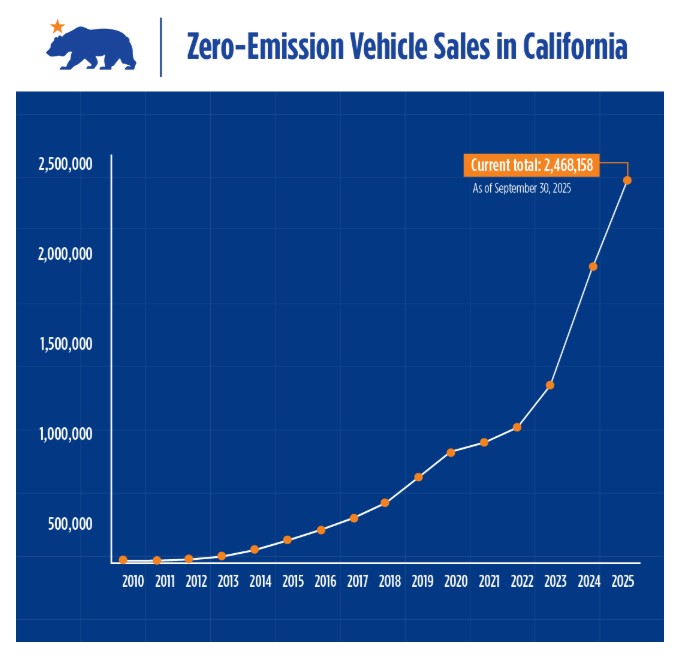Hydrogen and Electric Vehicles: California Breaks Sales Record for Zero-Emission Vehicles in Q3
Sacramento (USA) - Demand for zero-emission vehicles (ZEVs) in California is soaring, despite efforts by the Trump administration to hinder the Golden State’s pursuit of a 100% clean energy future. In the third quarter of 2025, 29.1% of all new car purchases were ZEVs - a new record.
Record EV Sales in California
“This is unprecedented - we’re nearing a third of all new vehicles sold in the fourth largest economy on the planet being clean cars,” said Governor Gavin Newsom. “ We’re setting new records because this state believes in innovation, not isolation. While Trump sells out American innovation to China, California will keep charging ahead on our path to a future of cleaner air.”
Nancy Skinner, Commissioner of the California Energy Commission (CEC), added: “This is a defining moment for California’s ZEV progress and sends a clear message to Washington: ZEVs are here to stay.” She emphasized that the work and investments of the CEC and its partners in expanding the state’s charging network have paid off, with almost every Californian now living within 10 minutes of a fast-charging station.
Skinner’s message is clear: “Now, new EV owners can enjoy a great driving experience bidding goodbye to smelly gas stations, messy oil changes, and costly engine tune-ups.”
Lauren Sanchez, Chair of the California Air Resources Board, added: “ While the federal government stumbles backward with reckless rollbacks and short-sighted policies, California charges ahead lighting the path to a cleaner, more prosperous future. From pioneering clean transportation in the 1970s to becoming the world’s 4th largest economy today, we’ve proven time and again that protecting air quality and the climate isn’t just the right thing to do, it’s smart economic policy.”

Diversity and Growth in the ZEV Market - Expanding Charging Infrastructure
The zero-emission vehicle market is becoming increasingly diverse: in Q1 2025, 146 ZEV models were available, compared to 105 the year before. Of the 124,755 ZEVs purchased in Q3, 108,685 were battery electric vehicles (BEVs) - another all-time high. Compared to Q2 2025, EV sales increased by nearly 30%. Consumer confidence in both the technology and the infrastructure is visibly growing.
California is the first U.S. state to implement binding reliability and reporting standards for public charging stations, improving the performance of publicly funded fast chargers and ensuring greater transparency across the state charging network.
On October 8, 2025, the California Energy Commission (CEC) approved the construction of 64 new fast chargers along key highway corridors under the NEVI program, helping to reduce range anxiety. Grants were also approved for the repair of 30 existing and installation of 30 new fast chargers. Three additional grants totaling over $10 million will fund the construction of more than 1,000 Level 2 chargers, primarily in multi-family housing for low-income and underserved communities.
Low-income Californians are also eligible for thousands of dollars in grants and rebates when purchasing a ZEV. The state is cutting red tape and prioritizing infrastructure development in hard-to-reach regions.
One Million Charging Points - The Gold Standard for American EV Infrastructure
While state funding programs continue to boost ZEV adoption, driving electric vehicles is becoming increasingly practical in everyday life. California now has over 200,000 publicly accessible charging stations, located at supermarkets, park-and-ride facilities, gas stations, apartment complexes, workplaces, clinics, and sports venues. This is complemented by around 800,000 private home chargers, a crucial factor for widespread EV adoption.
About the California Energy Commission (CEC)
The California Energy Commission is the state’s primary energy policy and planning agency. Its seven core responsibilities include advancing energy policy, promoting energy efficiency, certifying thermal power plants, investing in energy innovation, expanding renewable energy, transforming the transportation sector, preparing for energy emergencies.
Source: IWR Online, 17 Oct 2025
